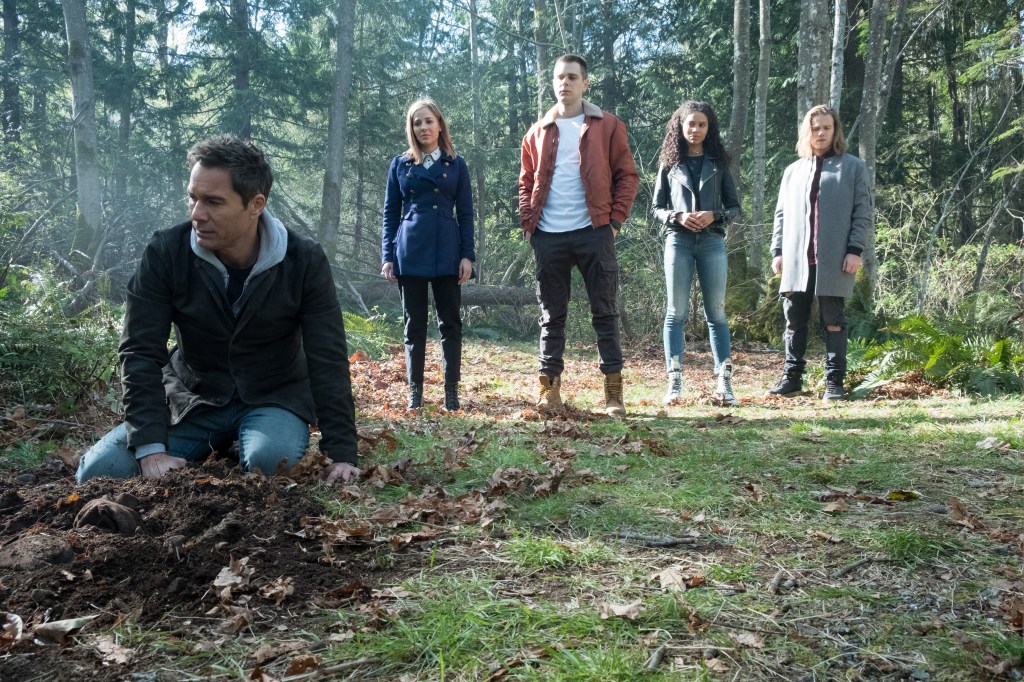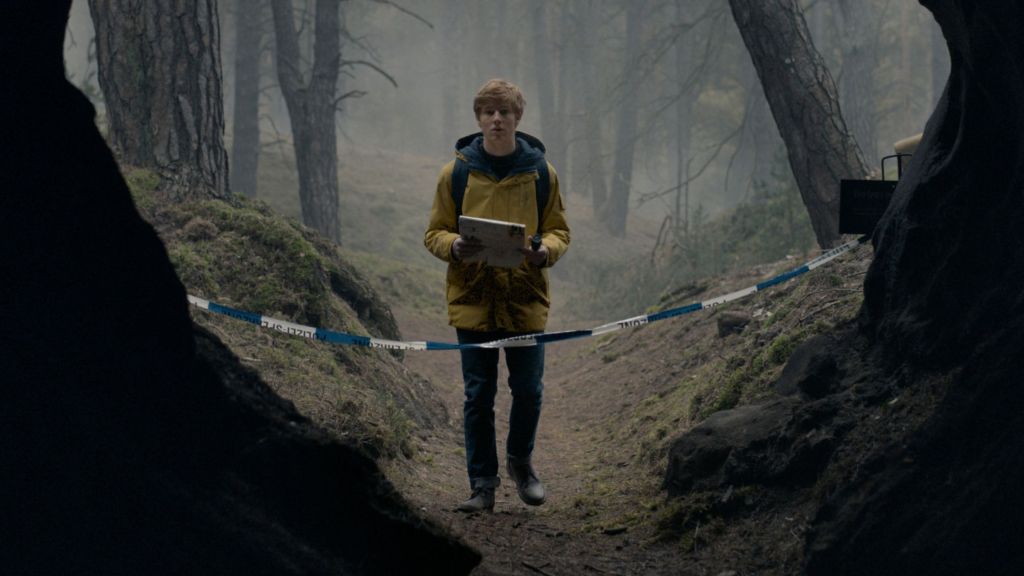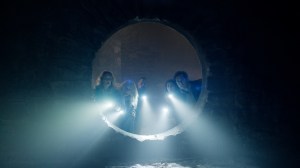Time travel is one of the most enduring and fascinating concepts in all of science fiction. The idea of breaking free from the linear progression of moments to revisit the past or glimpse the future taps into our deepest desires and fears about choice, destiny, and the consequences of our actions. It’s no wonder that time-travelling provides a narrative framework for writers to explore complex philosophical questions while delivering mind-bending stories. From grand, epic adventures to intimate character studies, the genre’s flexibility allows it to be molded into countless shapes, consistently finding new ways to challenge audiences and reinvent its own conventions for a new generation.
Videos by ComicBook.com
The serialized television format that rules the streaming era has proven to be the perfect medium for time-traveling narratives. Platforms like Netflix have become a haven for ambitious creators looking to weave long-form stories that demand viewer attention and reward it with rich plots. The best of these shows use time travel as the central engine for exploring the depths of human connection, trauma, and the eternal struggle between fate and free will, deserving the full attention of sci-fi aficionados.
5) The Lazarus Project

The British thriller The Lazarus Project presents a unique take on the time loop concept, expanding it to a global scale. The series centers on George (Paapa Essiedu), a simple app developer who discovers he is one of the few people who can naturally remember time being reset. He is soon recruited into the titular Lazarus Project, a clandestine organization that possesses the technology to turn back time to a specific checkpoint whenever the world faces an extinction-level threat. This power allows them to avert global catastrophes, but each reset comes with a heavy moral and personal cost for the agents involved.
The Lazarus Project excels by grounding its massive sci-fi premise in a deeply personal story. When a personal tragedy strikes George, he is faced with an impossible choice: accept his loss or betray the organization that saved the world to save the person he loves. This conflict drives the narrative, turning the show into a tense exploration of ethical compromises and the corrupting nature of power. The only reason The Lazarus Project ranks lower than other sci-fi series about time-traveling is that the show got cancelled after two seasons, leaving its story incomplete.
4) The Umbrella Academy

While The Umbrella Academy is a superhero story at its core, time travel is the ever-present force that shapes its entire narrative. The series follows the dysfunctional Hargreeves siblings, a group of superpowered individuals who were adopted as infants by an eccentric billionaire. After reuniting as adults, they find themselves constantly trying to prevent an apocalypse, a task made infinitely more difficult by the fact that they are often the ones who cause it through their clumsy and reckless manipulation of the timeline. Their temporal misadventures land them in various decades, forcing them to navigate unfamiliar settings while being hunted by timeline-preserving assassins.
The Umbrella Academy uses time travel less as a subject of rigorous scientific inquiry and more as a catalyst for wild, character-driven storytelling. The temporal mechanics are often loose and secondary to the emotional and comedic journey of the siblings. Still, the constant threat of world-ending paradoxes serves as the ultimate pressure cooker, forcing these emotionally stunted heroes to confront their shared trauma and deep-seated resentments in the most bizarre and stylish ways imaginable.
3) Travelers

Travelers offers a refreshingly grounded approach to time travel, built on a foundation of strict rules and complex moral dilemmas. The series is set in a distant future where the last remnants of humanity send their consciousnesses back to the 21st century. These “Travelers” transfer their minds into the bodies of host individuals who are documented to die at a precise moment, assuming their lives to carry out missions that will prevent the future collapse of society. Led by FBI agent Grant MacLaren (Eric McCormack), one team of operatives must navigate their new lives while secretly working to alter the course of history.
The show’s brilliance lies in its focus on the human element and the intricate logistics of its premise. Each episode presents a new mission, giving the series a compelling procedural structure that explores the ethical gray areas of the Travelers’ actions. The characters are constantly forced to balance their world-saving objectives with the personal lives they have inherited, leading to dramatic conflicts. Travelers is a smart, character-focused series that uses its high-concept sci-fi hook to tell a story about sacrifice, identity, and the quiet burden of saving a world that does not even know it is in danger.
2) Russian Doll

At first glance, Russian Doll presents itself as a darkly comedic take on the classic time loop formula. The show follows Nadia Vulvokov (Natasha Lyonne), a cynical software engineer who finds herself trapped in a loop, reliving the night of her 36th birthday party over and over again. Every time she dies, whether by accident or by her own hand, she is instantly reset to the same moment in the party’s bathroom. Her initial attempts to understand and escape her predicament are fueled by a sharp wit and a self-destructive streak, creating a puzzle-box narrative that is as hilarious as it is intriguing.
The series soon reveals itself to be something far deeper and more profound. The time loop is not just a plot device but a powerful metaphor for trauma, addiction, and the difficult work of breaking free from cycles of self-sabotage. When Nadia discovers she is not alone in the loop, meeting a man named Alan (Charlie Barnett) who is experiencing a similar phenomenon, the show transforms into an exploration of human connection and mutual healing. In the end, Russian Doll uses its sci-fi premise to explore the nature of personal growth, making it one of the most inventive shows on Netflix.
1) Dark

The German-language series Dark is a masterpiece of the genre and one of the most intricately plotted television series ever created. The story begins in the small town of Winden, where the disappearance of a young boy sets off a chain of events that exposes the fractured relationships and dark secrets of four interconnected families. The mystery quickly spirals into a mind-bending temporal conspiracy when it is revealed that a cave system beneath the local nuclear power plant contains a wormhole, allowing travel between different time periods.
Dark demands its audience’s complete attention, and it rewards that focus with a flawless, meticulously crafted narrative where every detail matters. That’s because the show’s timeline is a tangled but internally consistent web of paradoxes, family trees that defy logic, and philosophical questions about determinism. Unlike many time travel stories that shy away from the complexities, this series dives into them headfirst, building a story where past, present, and future are locked in an inescapable loop. Furthermore, Dark‘s grim atmosphere, compelling characters, and breathtaking plot twists create an unforgettable viewing experience that stands as the absolute pinnacle of serialized sci-fi storytelling.
What other time travel series on Netflix do you think is essential viewing? Leave a comment below and join the conversation now in the ComicBook Forum!









